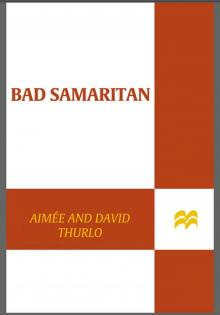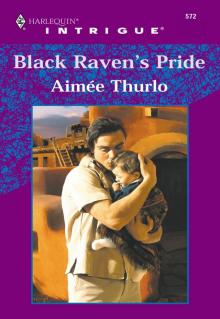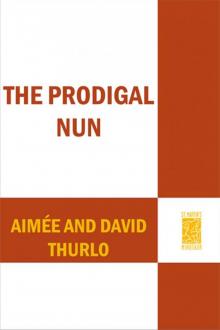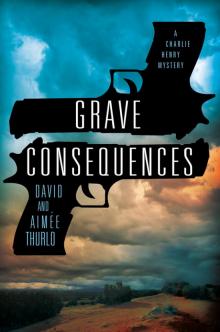- Home
- Aimée Thurlo
The Prodigal Nun
The Prodigal Nun Read online
Also by Aimée and David Thurlo
The Sister Agatha Series
Bad Faith
Thief in Retreat
Prey for a Miracle
False Witness
The Ella Clah Series
Blackening Song
Death Walker
Bad Medicine
Enemy Way
Shooting Chant
Red Mesa
Changing Woman
Tracking Bear
Wind Spirit
White Thunder
Mourning Dove
Turquoise Girl
The Prodigal
Nun
AIMÉE AND DAVID THURLO
St. Martin’s Minotaur New York
This is a work of fiction. All of the characters, organizations, and events portrayed in this novel are either products of the author’s imagination or are used fictitiously.
THE PRODIGAL NUN. Copyright © 2008 by Aimée and David Thurlo. All rights reserved. Printed in the United States of America. For information, address St. Martin’s Press, 175 Fifth Avenue, New York, N.Y. 10010.
www.minotaurbooks.com
Design by Dylan Greif
Library of Congress Cataloging-in-Publication Data
Thurlo, Aimée.
The prodigal nun: a Sister Agatha mystery / Aimee and David Thurlo.—1st ed.
p. cm.
ISBN-13: 978-0-312-36731-2
ISBN-10: 0-312-36731-7
1. Agatha, Sister (Fictitious character)—Fiction. 2. Nuns—Fiction. 3. Catholics—Fiction. 4. New Mexico—Fiction. 5. Monasteries— Fiction. I. Thurlo, David. II. Title.
PS3570.H82P76 2008
813’.54—dc22
2008011561
First Edition: July 2008
10 9 8 7 6 5 4 3 2 1
To Laura, who helped us find our faithful office companion, Gabriel,
and to the Carolina Poodle Rescue folks, who helped us bring him
to New Mexico. Thank you all for bringing Gabriel into our lives.
Acknowledgments
With special thanks to Phillip and Diane Uzdawinis for sharing their time and knowledge with us whenever we needed them. Job had nothing on you guys!
1
IN THIS CORNER OF NEW MEXICO, ONLY NUNS AND FARMERS got up before sunrise every day of the week. Sister Agatha took her customary place in the last pew of the old adobe chapel at Our Lady of Hope Monastery. The voices of her cloistered sisters behind the partition rose in an angelic blend of altos and sopranos, praising God with one heart.
Extern nuns like Sister Agatha were the monastery’s lifeblood. Sisters who had not taken a vow of enclosure, they kept the monastery running smoothly by handling necessary duties like shopping and greeting visitors.
The externs worshiped in the public section of the chapel where she was this morning. Looking around, Sister Agatha noted that the uncloistered section of the chapel was nearly empty. Only five of their regulars from town had come to six-thirty Mass this Sunday. Masses in town started at eight—practically midmorning to Sister Agatha—and those services were far more appealing to those who wanted a leisurely breakfast before venturing out.
Sister Agatha made the sign of the cross and whispered “Amen” as Father Rick Mahoney ended his greeting. Knowing that one of their regulars was missing but would soon arrive, Sister Agatha glanced back at the tall entrance doors. One thing that could be said about Jane Sanchez was that she had perfect timing. The woman always came in right before the first reading—the last possible minute that still allowed her to meet her Sunday obligation.
In her midfifties, hardworking, and devout, Jane seemed to be a good wife to her husband, Louis. Although they were usually together whenever Sister Agatha met them in town, Jane normally came to Mass alone.
As the reading from Acts began—Jane had cut it too close today—Sister Agatha heard a car outside, then a door slam. She listened for the sound of heels on the steps outside but instead heard a hollow snap, like someone with gum blowing a bubble.
Last Friday, Jane had called the monastery and spoken to Sister Agatha briefly. Something had disturbed her deeply, but she’d been reluctant to discuss it on the phone, afraid she’d be overheard. Too busy to meet with her that day, Sister Agatha had convinced her to stop by the parlor on Saturday, but Jane hadn’t shown up.
A former journalist, Sister Agatha was always energized by cryptic calls, and she was really curious now. Jane’s problem probably had something to do with her relatives. She didn’t get along with her daughter or son-in-law and had recently sought out counseling from Father Mahoney. Sister Agatha had speculated that Jane had been dissatisfied with Father’s take on whatever had happened and now wanted a woman’s perspective.
Sister Agatha glanced back at the doors. She was looking forward to finally resolving the mystery of what Jane had seen. With effort, Sister Agatha pushed all distractions from her mind, faced front, and focused on the Eucharistic celebration. Soon Jane faded from her thoughts.
Early morning Mass tended to have very short sermons, and Father Mahoney used shorter Eucharistic prayers then, too. Since there were few at Communion besides the nuns, Mass usually lasted forty-five to fifty minutes.
Once Mass had ended, Sister Agatha stepped outside, and as she stood on the front steps, Mrs. Lenzi joined her.
“Good morning, Sister Agatha. I just wanted to say goodbye. I’ll be returning to Italy with my daughter this week, so I won’t be coming back to Mass at Our Lady of Hope.”
Mrs. Lenzi had been a regular for the past year, and she’d be missed. Sister Agatha was about to say so when a shrill scream pierced the air. Her heart hammering wildly, Sister Agatha looked around quickly for the source.
Before she’d even taken a step, Sister Bernarda shot past her and ran across the parking lot toward the cries. As an ex-marine, her soldier’s instincts always gave her the edge in emergencies.
Sister Agatha struggled to catch up to her fellow extern. Drawing near, she saw Mrs. Brown, who’d been the first to leave chapel, on her knees, sobbing. A figure was lying on the ground beside her.
Hearing running footsteps behind her, Sister Agatha turned and saw Sister Jo rushing up. “Go back and call the paramedics. Someone has been injured.”
“Right away, Sister Agatha!” Sister Jo turned around and raced toward the parlor.
Uncertain if the parking lot was now a danger zone, Sister Agatha realized that the best place for the worshipers was inside.
“Everyone, please return to the chapel now, for your own safety.” She watched as Mrs. Lenzi and the rest stopped, saw that something was wrong, then complied.
Sister Bernarda glanced back at Sister Agatha and shook her head imperceptibly. She then focused on eighty-two-year-old Mrs. Brown and led her away, speaking calmly.
Sister Agatha took an unsteady breath. Based on Sister Bernarda’s cue, the person sprawled on the graveled parking lot was beyond help. Taking a step closer, Sister Agatha realized that the body belonged to Jane Sanchez.
Sister Agatha made the sign of the cross. Shock numbed her senses, and for a moment she stood frozen to the spot. Their monastery was dedicated to the Lord, and a sin of this magnitude was an affront to everything they stood for—charity and love, based on a deep reverence for all of God’s commandments. Reaching out to God for courage and the wisdom to accept what she couldn’t change, she said a prayer for the repose of Jane’s soul.
When she opened her eyes again, her gaze fell on the earthly remains of the woman they’d all known. Sister Agatha forced herself to study the scene with the practiced eye of an investigative reporter. Though that had been a lifetime ago, those skills would remain with her forever.
She crouched beside the body and, making s
ure not to touch anything, blinked back a tear. There was blood—Jane had either been shot or stabbed, and her purse lay open on the ground beside her. Scattered about were her keys, an empty-looking billfold, an embroidered handkerchief, a ballpoint pen, and her prayer book. She had been robbed and killed…or vice versa.
Sister Agatha took a deep breath, tearing her gaze from the body. She glanced around to avoid having to look at it again. It was then she realized that the doors of at least two of the cars in the parking lot were open. Maybe Jane had caught the robber riffling through the vehicles and confronted him. Robbery had then turned into murder.
Sister Agatha suddenly noticed that the driver’s door of the monastery’s old station wagon, the car they jokingly referred to as the Antichrysler, was also open. It had been vandalized with big scratches.
Hearing running footsteps coming toward her again, Sister Agatha turned her head. Sister Jo could have been her twin in size and shape, though there was a lot more bounce in the younger nun’s step. Sister Jo, the latest addition to their family, was gifted with a sharp mind and immeasurable amounts of energy. Pax, the monastery’s large white German shepherd, had followed but now rushed out in front of her.
“Pax, wait!” Sister Jo ordered, grabbing the dog’s collar.
Pax dropped his haunches into an immediate sit but slid several inches. Sister Jo wrapped her arms around the dog’s neck, making sure he went no farther.
“No need for that, he’ll stay,” Sister Agatha said. “Did you make the call?”
“Yes, but Sister Bernarda said I should call the sheriff as well. She said that Mrs. Sanchez had either been shot or stabbed and was already dead. So I called the sheriff and told him what had happened. He said to keep everyone away from the scene and make sure no one touched anything. He also asked that everyone stay inside the chapel until he and his team get here.”
“All right,” Sister Agatha said. “Do as he asked and make sure everyone remains inside. I’ll stay out here, guard the area, and make sure no one approaches.”
“What if the killer comes back?” Sister Jo asked, standing on tiptoes, trying to look past Sister Agatha to get a glimpse of the body.
“That’s not likely, but Pax will protect me,” Sister Agatha answered, moving to block her view. “Go back and help Sister Bernarda and Sister de Lourdes keep everyone calm. Nobody can be allowed to leave until the sheriff says it’s okay.”
Just then Sister Bernarda come down the chapel’s steps and strode briskly toward them. “The paramedics are on their way. As soon as they arrive, please send them inside. They need to check out Mrs. Brown,” she said. “She’s as pale as a ghost, and I think she’s going into shock.”
“Poor woman,” Sister Agatha murmured.
“I know the sheriff will want to speak to her, but I have a feeling he’s going to have to wait,” Sister Bernarda said softly. “She’s barely coherent at the moment.”
“Did Mrs. Brown mention having seen someone leaving the parking lot in a hurry?”
Sister Bernarda shook her head. “She just rambled on about how nice Jane had been to her. She’d always make sure that Mrs. Brown had a hot dinner. That was before the Good News Meal Program got started.”
“Jane always said that no one in her neighborhood would ever go hungry while her two hands still worked,” Sister Agatha said quietly.
“There’s something I need you to pass on to the sheriff,” Sister Bernarda said. “When Mrs. Brown saw Jane on the ground, she hurried right over to help. There’s no telling what she might have touched.”
“Of course. Sheriff Green will go easy when he talks to her. He’s a good man,” Sister Agatha said.
As Sister Bernarda left with Sister Jo, Sister Agatha confronted the knowledge that Jane had needed to talk to her about something and she hadn’t made time to help. She’d allowed other concerns to overrule the second great commandment—to love thy neighbor as thyself. Guilt made her chest tighten. Was Jane’s problem somehow related to her death, or was it just an unfortunate coincidence?
Sister Agatha had no time to ponder the question. Sirens filled the air.
The paramedics, despite being called last, pulled up first. After taking a quick look at Jane’s body, the three-person team rushed toward Sister Bernarda, who was standing at the entrance to the chapel.
Sheriff Tom Green arrived next, with the crime scene van and another squad car trailing behind. Sheriff Green, a tall former college track star with thinning hair and a slender waist, joined her a moment later. As he adjusted the latex gloves required for his work, she noticed that his pale blue eyes were bloodshot and his face was drawn with fatigue.
“Before you say anything, no, I’m not sick or hungover. We had a long night at the station. I’d be home in bed right now if I hadn’t been in the area when the call came through,” he said. “Now tell me everything you saw and heard. Sister Jo said that the victim may have been shot.”
Sister Agatha recounted the sequence of events, including the sound of the car door, the pop, and finally how Mrs. Brown had discovered the body. She then pointed out the car break-ins and the way the Antichrysler had been vandalized.
“Doesn’t anyone lock their car doors?” Sheriff Green muttered.
“Maybe at St. Augustine’s in Bernalillo. But out here, we all feel—felt—safe,” she answered.
“You mentioned a pop. That had to have been the gunshot. It makes sense that the killer would use a small caliber—less noisy,” he said.
“My brother and I used to shoot tin cans with his .22, so I’ve heard gunshots plenty of times. But the noise I heard was more of a pop—or more precisely, a plop—not quite like a gunshot, really. It reminded me of a bubble of chewing gum being popped, only a little softer, I guess. I didn’t give it much thought at the time.” She took an unsteady breath, then added, in a voice that didn’t sound like her own, “I should have gone outside to check when she didn’t come into the chapel.”
“I hope you’re not blaming yourself. If you’d come out to look, you would have undoubtedly interrupted the killer while he was going through her purse or through the other vehicles. You might have become his second victim.”
“Maybe so,” she answered in a whisper.
“It’s possible, from what you said, that the gun had a silencer. Did you hear any other noises outside?” Tom pressed.
“No.”
They both looked over as a black car roared up and slid to a stop beside Tom’s vehicle, raising a small cloud of dust. A red-haired man in an expensive gray suit, turquoise bolo tie, and black Western boots climbed out. He took a step toward them, but Tom intercepted him before he could come closer.
“Stay put, Albrecht. Crime scene here,” he said, gesturing to the deputy who was working quickly to put up the yellow tape.
“Understood,” the man said, moving back and bringing out a BlackBerry.
“What’s Fritz Albrecht doing here?” Sister Agatha asked Tom softly. “The last I knew, he was working for Channel 7 in Albuquerque.”
“He’s on Mayor Garcia’s staff now. His official title is law enforcement liaison, but he’s more of a pain in the…neck, or thereabouts.”
“Back when I was a journalist, the word was that he was a real lightweight as a reporter. He was more of the press conference type.”
“Word has come down from above—Mayor Garcia, not God—that our department needs to improve our image, and we’ve been told to pay particular attention to community relations. Fritz is supposed to help us out on that. If we look good, Garcia looks good,” Tom said in a taut voice.
“And what else, Tom?” she pressed, reading his tone correctly.
“I’ve been told to make sure civilians don’t get involved in our criminal cases. When citizens uncover vital evidence, it makes us look incompetent, according to Garcia.”
“I guess that means me, but this time the monastery has a vital interest in what’s going on. My old journalism skills can be an asset to you now.
I’m not after credit. Your department can take it all.”
“This is a murder investigation, Sister, and you need to stand back and go about your own…calling,” he said as the tape was placed between them.
“That’s kinda hard to do, Tom. One of our own parishioners just got killed outside our chapel.”
“Yeah, and let’s hope this leads away from the monastery, not toward it.” Seeing Albrecht staring at both of them, he looked back at Sister Agatha. “I better get to it.”
He went to look at the black beaded handbag lying on the ground. Less than a foot away was the victim’s wallet. He picked that up, taking a closer look. “No money, but he left a credit card, her driver’s license, and a voter ID card,” he said, just loud enough for Sister Agatha to hear.
“She has her watch and rings, too, and a pearl necklace that looks expensive,” Sister Agatha said after making sure Fritz wasn’t within hearing distance.
“That kind of thing is hard to get rid of around here,” he answered. “I’ll check and see if she carried more credit cards and a checkbook. Did she normally make her offering with cash or a check?”
“Our cellarer would know. I’ll ask her,” she answered, then added, “Where’s her cell phone? I know she carried one.”
Tom looked in the purse and around the area, then stood. “It might be in a pocket, or her car. Thanks for the tip. Anything else you might want to add?”
“Yeah,” she admitted reluctantly, guilt forming a lump at the back of her throat. “Jane called me on Friday. Something she’d seen was really bothering her, but I was too busy at the time to meet with her. I asked her to come to the parlor the next day, but she never did.”
“Interesting. I’ll check it out with her husband and see if he can tell me what that was about, but it may be totally unrelated.”
She swallowed hard but didn’t comment. “I know Father Mahoney had been counseling her regularly, but I don’t know the details. You’ll have to ask him about that yourself.”

 Fatal Charm
Fatal Charm Christmas Witness
Christmas Witness Blood Retribution
Blood Retribution Power of the Raven
Power of the Raven Eagle's Last Stand
Eagle's Last Stand Bad Samaritan
Bad Samaritan Navajo Justice
Navajo Justice Undercover Warrior
Undercover Warrior Wind Spirit: An Ella Clah Novel (Ella Clah Novels)
Wind Spirit: An Ella Clah Novel (Ella Clah Novels) Black Raven's Pride
Black Raven's Pride Redhawk's Return
Redhawk's Return Second Sunrise
Second Sunrise Her Hero
Her Hero The Prodigal Nun
The Prodigal Nun Her Destiny
Her Destiny Navajo Courage
Navajo Courage Grave Consequences
Grave Consequences Homespun Christmas
Homespun Christmas Winter Hawk's Legend
Winter Hawk's Legend Twilight Warrior
Twilight Warrior Restless Wind
Restless Wind Pale Death
Pale Death A Time of Change
A Time of Change Secrets of the Lynx
Secrets of the Lynx Her Shadow
Her Shadow Falcon's Run
Falcon's Run Alpha Warrior
Alpha Warrior When Lightning Strikes
When Lightning Strikes Looking Through Darkness
Looking Through Darkness